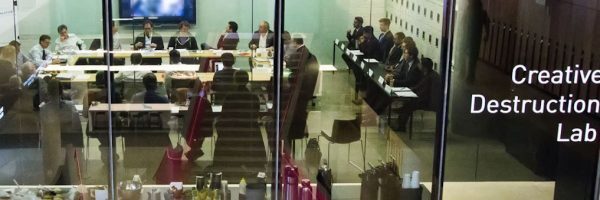DeGroote Professor Workplace Policy Helps Shape New Law, and More -Toronto News

This week, Toronto business schools discuss substantial contributions to the workplace, researchers from DeGroote and Ryerson have each worked to make workplaces more just and equitable, and a new book by Rotman professors gives practical tools for incorporating AI into business.
Doing Right By Employees Ultimately Pays Off – McMaster Brighter World
Research from Isik Zeytinoglu, professor of human resources and management at McMaster University’s DeGroote School of Business, has shown that treating employees well may be a shrewd move for employers. Dr. Zeytinoglu, whose research influenced the World Health Organization’s WHO Healthy Workplace Framework, has been touting the benefits of a healthy relationship between employers and workers for over 30 years. The Fair Workplaces, Better Jobs Act, which came into effect at the beginning of April, had many benefits and protections for workers, including a requirement that part-time and temp employees must receive the same pay as full-time staff for the same work.
“In the long term, equity helps society, the community, and the economy,” Zeytinoglu said. “Throughout history, there have been employers who considered fairness and behaved justly toward their workers, and they are the ones who have prospered.” It is no coincidence that the new law aligns with much of Zeytinoglu’s research; in fact, the government consulted the professor during the bill’s formative stages.
Read more about the new bill and Zeytinoglu’s work here.
These Are the Workplace Gender Equity Tactics That Actually Work – Canadian Business
This week, professors at Ryerson University’s Ted Rogers School of Management, Martin Fabro and Chris MacDonald, wrote an article on gender equity for Canadian Business; a follow-up to one the authors wrote in late March, “A Seven-Step Plan To Improve Gender Diversity At Any Company.” While the first piece offered actionable instructions to improve gender diversity, Fabro and MacDonald focused their follow-up on which of the most popular gender diversity tactics were rooted in evidence-based practices.
The Ryerson researchers explored which gender equity practices helped to either, “actively improve gender diversity (and in particular to increase the number of women in leadership roles), and to reduce underlying gender bias and discriminatory attitudes within the organizational culture.”
Learn more about improving gender equity in the workplace here.
PREDICTION MACHINES: The Simple Economics of Artificial Intelligence – Rotman New Releases
In their new book, PREDICTION MACHINES: The Simple Economics of Artificial Intelligence, Ajay Agrawal, Joshua Gans, and Avi Goldfarb took on the task of theorizing the possible role of artificial intelligence in business. In the past, the possible effects of AI on business seemed so vast, they were difficult to tackle. Agrawal, Gans, and Goldfarb demystify AI, by re-framing it as a prediction tool.
“More than just an account of AI’s powerful capabilities, PREDICTION MACHINES shows managers how they can most effectively leverage AI, disrupting business as usual only where required, and provides businesses with a toolkit to navigate the coming wave of challenges and opportunities.”
A book launch was held at the Rotman School of Management on April 16.
You can read more about PREDICTION MACHINES here.
Inside the University of Toronto’s Creative Destruction Lab

The Creative Destruction Lab (CDL) at the University of Toronto Rotman School of Business is a seed-stage program created exclusively for scalable science-based companies. Launched in 2012, this program employs objectives-based mentoring to help maximize equity value creation for its ventures. The lab is best suited for early-stage companies, particularly those with links to university research labs.
The Creative Destruction Lab Program
The CDL is a nine-month program that employs a coaching process to help business founders commercialize their advances in science and technology. There are four main elements of the program:
- Mentorship: The founders work alongside select entrepreneurs and angel investors in intensive full-day sessions to assess their business progress and to set short-term objectives.
- Investment Opportunities: Founders have the chance to raise capital in meetings with entrepreneurs, angel investors, and partners from leading venture capital firms.
- Technical Feedback: The founders receive advice on their technical road maps and objectives from world-renowned experts at leading academic institutions.
- Business Development Support: Finally, the founders are able to work with MBA students to develop their financial models, evaluate potential markets, and fine-tune their strategies for scaling.
“The breadth and depth of insight that we were given access to was phenomenal,” said participant Karl Martin, founder of Nymi, a wearable technology firm in the healthcare space.
CDL Locations
Unlike many seed-stage programs, CDL has centers in five locations across Canada. Each location focuses on a specific stream of ventures and offers specific resources.
- Calgary: Working with the Haskayne School of Business, the Calgary location focuses on a few key research pillars including energy innovations, human dynamics, engineering solutions for health, new earth-space technologies, and other areas.
- Halifax: The Halifax location leverages the Rowe School of Business at Dalhousie University and fosters “blue-green” technology—focused on agri-tech, bioproducts, and environmental technology—and “prime” technology, including startups tackling problems in healthcare, finance, energy, chemical, media, transportation, and agriculture.
- Montreal: In partnership with HEC Montréal, the Montreal location focuses on startups using artificial intelligence and data analysis technologies.
- Toronto: The main location in Toronto, run alongside the Rotman School of Management, focuses on three types of startups. The first is “Prime” startups tackling problems in healthcare, finance, energy, chemical, media, transportation, and agriculture. Meanwhile, Quantum Machine Learning startups are grounded in physics, math, statistics, machine learning, electrical engineering, and/or quantum computing. Finally, massively scalable Artificial Intelligence/Machine Learning startups focus exclusively on artificial intelligence and machine learning.
- Vancouver: Located in Vancouver, this location operates in partnership with the Sauder School of Business at the University of British Columbia. It focuses on startups in the “Prime” stream as well as those in BioMedTech, including chemical, biological, and medical ventures.
Partnership with NYU Stern to Expand CDL to New York
And, beginning on September 1, 2018, the Creative Destructive Lab will partner with the NYU Stern School of Business to establish its first lab outside of Canada. The newest location will bring Stern faculty and MBA students alongside angel investors, serial entrepreneurs, and founders of pre-seed stage startups in science and technology. CDL New York will begin accepting applications in January 2018 and expects to admit around 25 ventures the first year.
“Our model for developing massively scalable science-based ventures has proved successful in Canada. And we anticipate it will be similarly successful for our partners at NYU,” said Ajay Agrawal, a Rotman entrepreneurship professor and the founder and academic director of the lab, in a recent news release about the expansion.
New Program Executive Director
In other news, Rotman chose Sonia Sennik to be the inaugural executive director of the Creative Destruction Lab and its national network of programs. Sennik will be responsible for the lab’s oversight and coordination as well as its strategic operational and programmatic leadership.
As a recent graduate of Rotman’s Executive MBA program, Sennik is uniquely positioned for her new role. She was the inaugural recipient of the Rotman Social Impact Award and excelled in leadership during her time in the program. She’s also held senior project and engineering management roles at HATCH, a global engineering consultancy.
Of Sennik’s appointment, Agrawal said in a news release: “The Creative Destruction Lab is expanding rapidly, both geographically and programmatically. Sonia will provide leadership, vision, and energy to help ensure the success of the Lab and its ventures in the coming years.”
Graduates of CDL
Over the years, the Creative Destructive Lab has had many graduates, including:
- Thalmic Labs (Waterloo): Thalmic Labs develops revolutionary wearable technologies that explore the future of human-computer interaction.
- Atomwise (San Francisco): Atomwise is a Deep Learning technology designed for novel small molecule discovery to help develop better medicines faster.
- Deep Genomics (Toronto): Deep Genomics creates life-saving genetic therapies including a biologically accurate data- and AI-driven platform that supports geneticists, molecular biologists, and chemists.
- Kyndi (Palo Alto): Kyndi incorporates advanced artificial intelligence and symbolic natural language understanding to help knowledge workers process and consume vast amounts of information in order to better make critical decisions.
- Heuritech (Paris): Heuritech bridges the gap between social media and commerce with cutting-edge deep learning technology that detects emerging product buzzes online.
To learn more about the Creative Destructive Lab, including information about applying, visit the main CDL website.
This article has been edited and republished with permissions from Clear Admit.
MBA Graduate Joins Rotman as Lab Executive Director

At the Rotman School of Management at the University of Toronto, graduation can mean a new position with the school itself, which is exactly what happened to Sonia Sennik.
Sennik recently graduated from the school’s Executive MBA program, according to a press release. Now, she’s joining the business school as the first-ever national Executive Director of the Creative Destruction Lab. She will be working alongside lab founder and Academic Director Ajay Agrawal, the school’s Peter Munk Professor of Entrepreneurship. The lab has been helping science-based business ventures succeed since 2012. It mentors them what they need to know to get past the “seed stage.”
Rotman describes the lab:
“It employs a unique, objectives-focused coaching process to help founders commercialize advances in science and technology. The Lab also provides experiential learning to MBA students through year-long courses where students work alongside the Lab’s Fellows and venture founders, giving them a unique chance to learn how to evaluate, finance, and manage technology businesses.”
“The Creative Destruction Lab is expanding rapidly, both geographically and programmatically. Sonia will provide leadership, vision, and energy to help ensure the success of the Lab and its ventures in the coming years,” Agrawal said in the press release.
Sennik’s held important titles before, too. There’s HATCH, a consulting agency for engineering and construction projects, where she “held senior project and engineering management roles.” She was also the first to receive the Rotman Social Impact Award.
She’ll now help take the lab further, and it’s accomplished lots already. Its graduates prove it. Some of these companies include Atomwise in San Francisco and Kyndi in Palo Alto. This year, the lab expanded to include a program all about quantum machine learning startups.
We’ll see what’s next with Sennik in charge.
